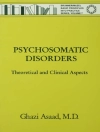This book covers the entire spectrum of eating disorders, including obesity, in a psychotherapy procedure-independent manner and is based on the latest treatment guidelines. All disorders are presented on the basis of current evidence and treatment guidelines that combine psychotherapeutic and pharmacological interventions to provide therapists with clear recommendations for treatment.
The 3rd edition has been completely revised to include important current topics and chapters, such as the inclusion of eating disorders in ICD 11/DSM 5, the role of the microbiome and the role of modern media e.g. ehealth in prevention and treatment. In addition, the editors and authors address, among other topics, systemic therapy as a new evidence-based psychotherapy and the discussion of addiction mechanisms in eating and weight disorders, and provide an outlook on the role of neurostimulation procedures to address current developments in obesity and eating disorders.
The book is suitable as a reference for physicians in training, educators, and psychologists, especially colleagues from the field of psychosomatics, psychiatrists, and psychotherapists in research, clinic and practice.
Jadual kandungan
Classification and diagnosis: a historical view.- Dieting behavior and body image in social change.- Clinical aspects of anorexia nervosa and bulimia nervosa in adulthood.- Atypical eating disorders and binge eating disorder.- Eating disorders in the DSM-5.- Diagnosis of eating disorders.- Epidemiology of eating disorders.- Course and prognosis of anorexia nervosa.- Course of bulimia nervosa and binge eating disorder.- Anorexia nervosa in childhood and adolescence.- Behavioral therapeutic model conceptions.- Psychodynamic model conceptions.- Eating disorders in men.- Eating disorders and competitive sports.- Genetic aspects of eating disorders.- Psychosocial risk factors.- Sociocultural aspects of eating disorders.- Body image disorder.- Affective disorders and anxiety disorders.- Psychological comorbidity and personality disorders.- Self-injurious behavior in eating disordered women.- Hunger and satiety.- Peripheral peptide hormones, neuropeptides, and neurotransmitters.- Reward system in eating disordered individuals and obesity.- Neuropsychological findings in eating disorders.- Imaging procedures in eating disorders.- Medical complications of anorexia and bulimia nervosa.- Gynaecological aspects of anorexia nervosa and bulimia nervosa.- Eating disorders and diabetes mellitus.- Prevention of eating disorders.- Treatment of eating disorders in childhood and adolescence.- Family therapy of eating disorders.- Psychodynamic therapy.- Cognitive behavioural therapy.- Interpersonal psychotherapy.- Pharmacotherapy of eating disorders.- Inpatient and day-care psychotherapy of eating disorders.- Treatment of body image disorders.- Self-help for eating disorders.- Anorexia nervosa from a nutritional therapy perspective.- Use of modern media in prevention and treatment.- Coercive treatment for anorexia nervosa.- Treatment of chronically ill female patients.- Working with family members.- Relapse prevention in anorexia nervosa.- Diagnostics and etiology of obesity.- Descriptive epidemiology of overweight and obesity.- Health economic consequences of obesity.- Genetic aspects of obesity.- Psychosocial factors of obesity in childhood and adolescence.- Risk factors of obesity in childhood and adolescence.- Drug-induced obesity.- Social and psychosocial impact of obesity: weight-related stigma and discrimination.- Obesity and psychological comorbidity.- Metabolic syndrome and depression.- Tobacco dependence in eating disorders and obesity.- Obesity as an addictive disorder.- Impulsivity and obesity.- Obesity and binge-eating disorder.- Prevention of obesity.- Treatment of obesity in childhood and adolescence.- Family-based approaches to treatment.- Fad diets and commercial programs.- Nutritional therapy of obesity.- Treatment of obesity – Exercise and physical activity.- Behavioral therapy of obesity.- Behavioral therapy in the updated S3 guideline Prevention and treatment of obesity.- Drug therapy of obesity.- Weight stabilization.- Obesity surgery treatment options.- Psychosomatic aspects of obesity surgery.- Treatment of obesity in diabetes mellitus.- Telemedicine and other media in obesity treatment.
Mengenai Pengarang
Prof. Dr. med. Stephan Herpertz, LWL University Hospital, Ruhr University Bochum
Prof. Dr. Martina de Zwaan, Hanover Medical School
Prof. Dr. med. Stephan Zipfel, University Hospital Tübingen












